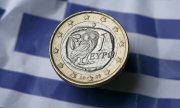Deal between Athens and its creditors
At a meeting in Malta Athens and its international creditors have cleared another hurdle on the path to new loans for the debt-ridden country. The Greek state is to cut spending by around two percent of the GDP as of 2019. Now Greece faces more austerity, some commentators write in annoyance. Others believe the deal will help stabilise the crisis-hit country.
EU badly needs a success story
The crisis-ridden EU also stands to benefit from this agreement that puts an end to the Greeks' suffering, the Irish Examiner comments.
“The over-riding impression is that Greece - especially Greeks happy to work and contribute to their struggling society - have suffered unduly. Hopefully, that period may be at an end, and the deal struck with the EU and international lenders around economic reform this week will finally restore some stability and possibility to one of the EU's struggling societies. ... Despite everything, and despite looming elections in France and Germany, the EU needs a success story to show it is still the best, if not the only, option for Europe. A rejuvenated Greece would be a powerful argument in that cause.”
A questionable agreement
The fact that there will be further austerity measures and that the creditors' inspectors will continue their work is annoying, the business paper Naftemporiki writes:
“The government agreed in Malta that after the end of the third austerity programme in 2018 there would be austerity measures amounting to two percent of GDP, without any new financing from the creditors. Although it didn't really want any new austerity measures, it has now agreed on this memorandum. ... In reality the Malta agreement isn't an agreement at all. There are still details that will have to be worked out when the creditors' inspectors finally return to Athens. The government has lost valuable time - which will prove very costly for the Greek economy and the country in general - simply to return to the point it was already at on February 20.”
This is not what security and stability look like
The new financial aid package can't conceal the strained economic situation in Greece, Der Standard warns:
“The last thing the Eurozone needs now is another debate about Greece and even about a Grexit like the one we saw in June 2015 - not least because of the explosive situation in neighbouring Turkey and Syria. When the Economic Affairs Commissioner Pierre Moscovici says that the Greeks deserve an end to uncertainty, he is right. Nevertheless: it is premature to send an all-clear signal regarding Athens' economic and budget situation. What was decided in Malta is a hopeful scenario that buys time, but nothing more. After a brief recovery the economy has once again collapsed. Two years after the elections, this left-leaning government that dabbles in right-wing populism is more unpopular than ever. This is certainly not what security and stability look like, and further loans running into the billions won't change that.”

